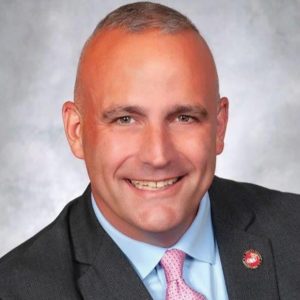EASTHAM — Donna Buckley, the Democrat hoping to be elected sheriff on Nov. 8, says the reason the Barnstable County Correctional Facility does not have effective mental health or substance abuse treatment for inmates is “because Sheriff James Cummings does not believe in it.”

Buckley, the former general counsel for the sheriff’s office, is running against Republican state Rep. Tim Whelan, a former state trooper.
Nov. 8 marks an important moment for the future of criminal justice on Cape Cod. Both the sheriff’s and the district attorney’s offices will be vacated by retiring Republicans. Cummings has been sheriff since 1998, and District Attorney Michael O’Keefe has been in office since 2002. (Democrat Rob Galibois, a criminal defense attorney, and Republican Daniel Higgins, a Barnstable County assistant district attorney, are vying for O’Keefe’s seat.)
When the Independent asked Cummings on Sept. 19 about his views on treatment of inmates with addiction, he recounted a conversation he had with an inmate incarcerated for his fifth drunk driving offense. Cummings said he asked the man if he was finally ready to change his ways, and the inmate replied, “Yeah, I gotta stop driving.”

Cummings’s point was that people with substance use disorders don’t want to change. That is why, he said, only 12 of 174 inmates at the jail are enrolled in the voluntary Residential Substance Abuse Treatment (RSAT) program, which offers time off their sentences if they participate.
“They are just doing their time until they can go out and get back to drinking and drugging,” Cummings said.
Buckley said that attitude reflects a philosophy that jail is mainly a place for punishment. In fact, she said at a forum in Eastham last week, sheriffs are not law enforcement officers in Massachusetts. Their charge is “correction, rehabilitation and treatment.”
“That is one of the critical themes of this election,” Buckley said. “We need to make sure our sheriff’s office is focused on correction, rehabilitation, and treatment, providing inmates with opportunities to rebuild their lives, experience the power of recovery, and try to live a life that will allow them to be productive and address their addiction issues and mental health issues. Otherwise, we are not safe.”
Buckley said her vision focuses on helping inmates address the root causes of their behavior.
“My opponent has a very different vision,” she said. “His vision is we’re doing a great job and we should do it for six more years.”
Not true, said Whelan in a phone interview. He said he regards jails “as frontline providers of services.”
Whelan said his first priority would be to look at the mental health and addiction programs “top to bottom.” He said he wants to offer job training and job fairs to bring employers into the jail.
“I believe medication-assisted treatment is critically important,” Whelan said. “Mental health care and RSAT are important, but getting them jobs is also critically important.”
The Jail Now
Nearly every question posed at the Sept. 23 Eastham forum was about addressing the reasons people get arrested. Mark Gabriele of Wellfleet said the Wellfleet police report a high number of mental health-related calls. About half of the county jail inmates report having a mental illness, and more than half report having substance use disorders.
Yet only 1.7 percent (or $538,037) of the sheriff’s $32-million operating budget is spent on mental health, Cummings said. The jail offers RSAT and two grant-funded programs that provide medication for opiate addiction. Medication-assisted treatment (MAT) is available to inmates who have a prescription when they are incarcerated or who wish to begin treatment in jail.
The only reason inmates can get these medicines, however, is that U.S. Attorney Rachael Rollins last year ordered Cummings to do it. Rollins warned Cummings he was violating the Americans With Disabilities Act, and he began offering methadone and suboxone to inmates in January 2022.
Cummings does not agree, despite the evidence that opioid medicines work, that they should be offered in jails.
“I don’t think it is doing them any good,” he said, asserting that medication is bought, sold, and traded in the jail and contributes to criminal behavior.
Lizz Matos, executive director of Prisoners’ Legal Services Massachusetts, said Cummings’s argument is “not evidence-based.” She said almost every inmate at the Barnstable jail has an addiction. “With those kinds of numbers, it’s pretty stunning that the sheriff had to be ordered to offer medication-assisted treatment,” Matos said.
Buckley supports full access to MAT. Whelan, who has been endorsed by Cummings, said he used to be against it but has changed his mind.
Budget Autonomy
As general counsel for the sheriff for the last four years (she resigned in March), Buckley said the sheriffs can spend money however they wish.
Matos said sheriffs have broad latitude to create jail programs, but no Massachusetts sheriff is using that freedom to address the fact that jails are warehouses for people with addiction and mental illness. Sheriff Peter Koutoujian of Middlesex County, Matos said, is the most progressive, and the Franklin County jail leads in substance use treatment because of Medical Director Ruth Potee.
Potee, a Greenfield-based crusader for addiction treatment, said meaningful reform must come from the state, which funds the jails. It needs to offer incentives to improve care, she said. One fix would be to allow inmates to keep their medical insurance when they are incarcerated; jails could then be reimbursed for psychiatric and addiction medicines.
County jails are about half full, Potee said. Built for 588, the Barnstable County Correctional Facility now has 174 inmates. Cummings said the numbers are down due to courts being closed during the pandemic.
Potee said the Covid reduction in inmates is a step in the right direction.
“If I were a legislator and saw half-full jails,” said Potee, “I would close the jails that are not addressing the issues that bring people in there.”
Sheriff and District Attorney Debates
Oct. 4: 9 a.m. on WCAI-FM
Oct. 12: 6 p.m. at the Tilden Arts Center, Cape Cod Community College; sponsored by the League of Women Voters
Oct. 19: 7 p.m. at Falmouth High School; sponsored by the League of Women Voters and Falmouth Community Television
Nov. 3: 7 p.m. on WXTK-FM
This article appeared in the Sept. 29, 2022 issue.



